Cinegy Convert Installation
Cinegy Convert has a unified installer that allows you to install all the components you need.
|
Caution
|
It is required to install critical Windows updates before the application installation. |
|
Caution
|
Cinegy Convert requires .NET Framework 4.8 (or later), which can be installed using the web installer during Cinegy Convert installation. The offline installer can be used if the web installer is unavailable due to a lack of Internet connectivity. In this case, make sure the .NET Framework 4.5 is activated as a Windows feature, then download the corresponding offline installer package directly from the Microsoft website. After the .NET Framework 4.8 is installed, the OS reboot is required. Otherwise, the installation may fail. |
To start the installation, run the Cinegy.Convert.Setup.exe file. The setup wizard will be launched:
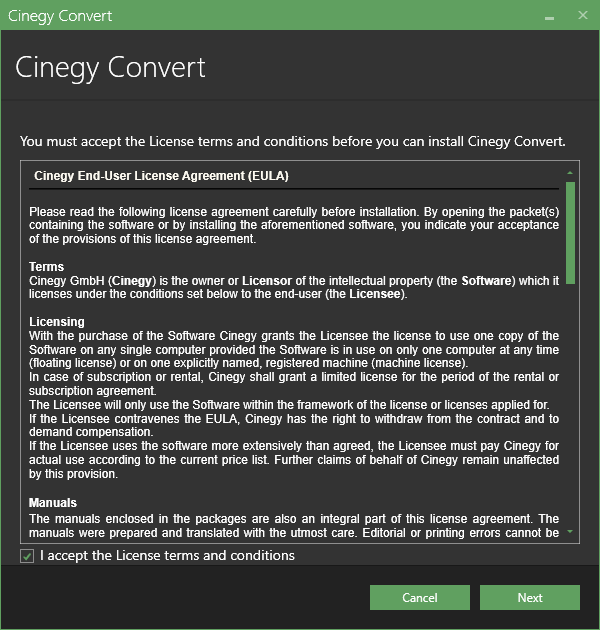
Read the License Agreement and check the box to accept its terms.
Select the installation mode depending on the purpose of using Cinegy Convert on the given machine:
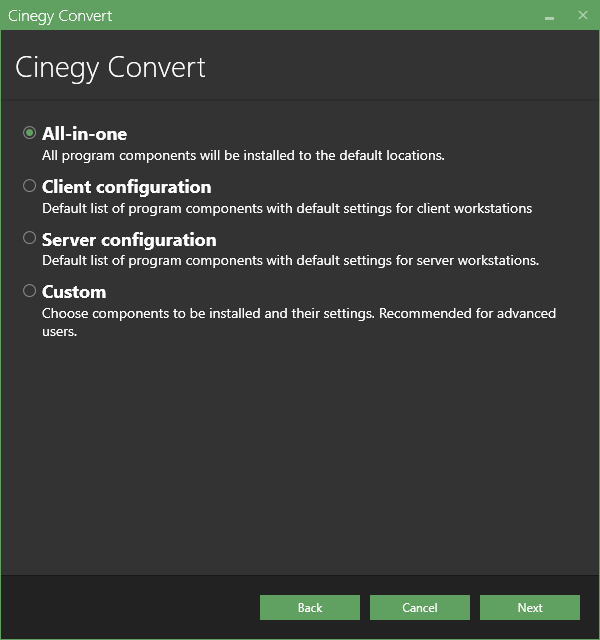
-
All-in-one – all product components will be installed with their default settings.
-
Client configuration – the product components for client workstations will be installed with their default settings.
-
Server configuration – the product components for server workstations will be installed with their default settings.
-
Custom – this installation mode allows choosing the components to be installed, their locations, and settings, and is recommended for advanced users.
All the package components available for the selected installation mode are listed in the following dialog:
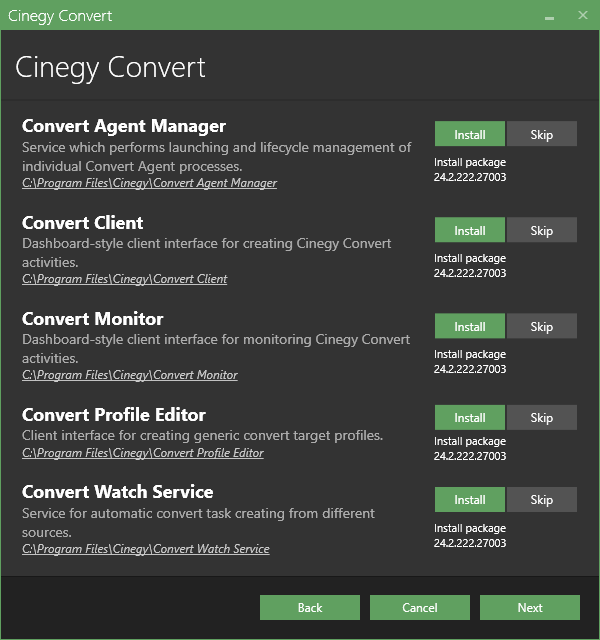
|
Enabled installation of the Cinegy Convert component(s) is indicated by the "Install" option selected and highlighted with green. |
|
Select the "Skip" option next to the relevant component to disable its installation. |
The default installation directory, which is indicated underneath the package component name, can be changed by clicking the path:
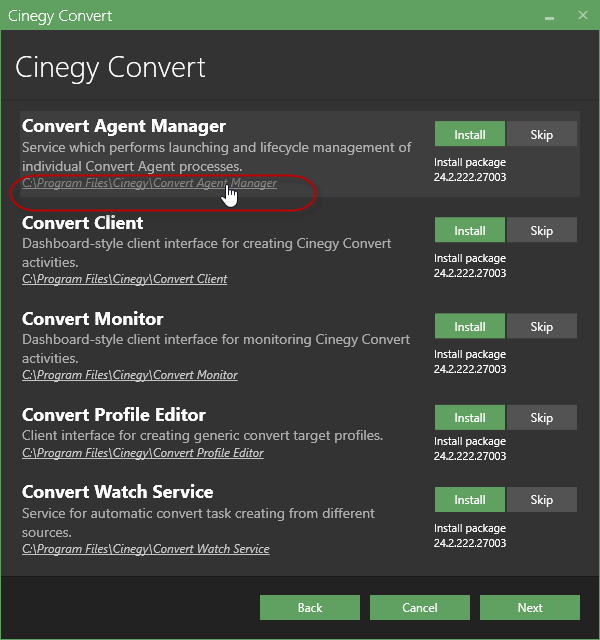
In the "Browse for folder" dialog that appears, select the required folder for your installation.
|
You can also create a new folder by pressing the "Make New Folder" button and entering a new folder name. Once the folder is selected, press "OK". |
Press "Next" to proceed with the installation.
Check whether your system is ready for installation in the following dialog:
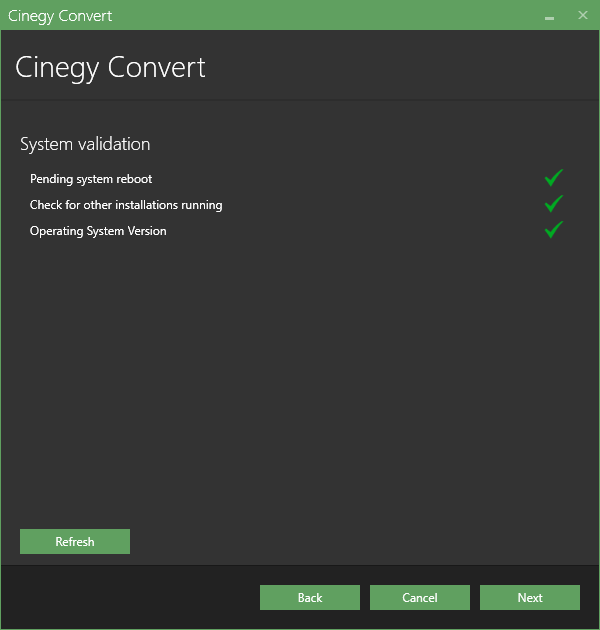
|
The green tick indicates that the system resources are ready and no other processes may prevent installation. Clicking the validation entry field displays its detailed information. |
|
While the system performs verification of any parameter, the checking progress is displayed. |
|
If any validation reveals that installation cannot be started, the respective field becomes highlighted and the red cross is displayed with detailed information on the failure reason below. |
|
Note
|
The explanation differs depending on the reason why the installation cannot proceed. |
|
Press the "Refresh" button for the system to recheck installation availability. Once the reason for prevention is excluded, you can proceed with the installation. |
Press "Back" to change the installation settings or "Cancel" to abort and exit the setup wizard.
|
Press the "Next" button to begin the installation. |
The progress bar indicates the progress of the installation process.
The following dialog informs that the installation is completed successfully:
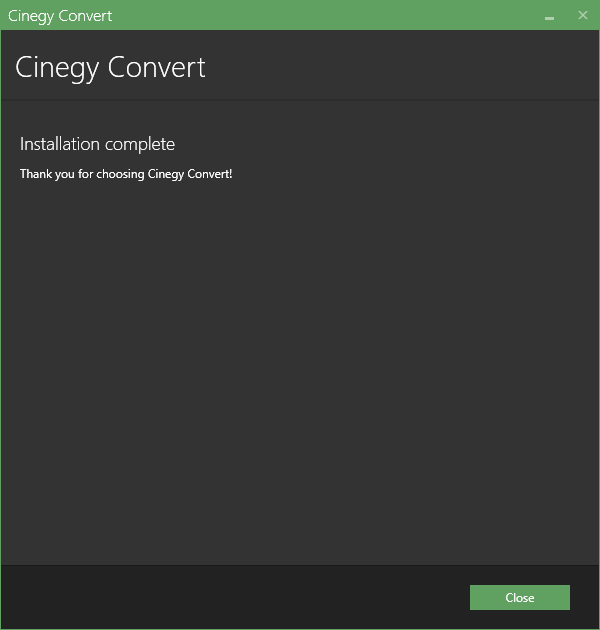
|
Press "Close" to exit the wizard. |
The shortcuts of all the installed Cinegy Convert components will appear on your Windows desktop.
Sample Profiles
With the Cinegy Convert installation, a set of sample profiles in CRTB format is added to the following location on your computer by default: C:\Users\Public\Public Documents\Cinegy\Convert Profile Editor.
This set of profiles can be imported into your database and used during the transcoding tasks creation. Refer to the Batch Import paragraph for a detailed description of how to import the whole pack of sample profiles. The profiles can be imported individually. Refer to the Importing Resources paragraph for an import procedure description.








